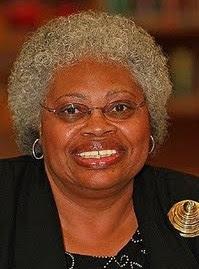Frazine Taylor featured in upcoming national magazine

June 5, 2023
A staff member at Alabama State University’s Levi Watkins Learning Center (LWLC) is the subject of an upcoming national magazine story due to her designation as one of the United States most accomplished authorities in the field of Black genealogical and family research.
The LWLC’s Frazine Taylor, whose African-American genealogical expertise and in-depth workshops have been heralded for decades within professional historical circles, has now attracted the attention of one of the nation’s most acclaimed news magazines, “The Christian Science Monitor,” which sent a reporter from Boston last week to interview her for an article to appear in one of its upcoming issues.
“Of course, I am pleased that a news magazine, such as one as well respected as the Christian Science Monitor, is doing a feature on me and my genealogy and family history work; however, I am not pleased for the mere sake that it gives me publicity and shines light on me in a positive way personally,” Taylor said. “I am much more excited in that it will shine a light of knowledge and inform many Black Americans that they too may discover their own heritage, learn about their people’s family roots, even beyond what was once considered the difficult-to-overcome obstacle of obtaining information that occurred before the 1870 U.S. Census records. We now have a much better ability to obtain data and track family information, so it’s more possible than ever before to learn about Black family history prior to emancipation, and I am here to help people discover their heritage.”
“MAKING A DIFFERENCE”
Sara Lang, a reporter with the Christian Science Monitor, works out of Boston and made a special appointment to come to campus to interview Taylor and other top LWLC staff members.
“I would love to write an article (on Frazine Taylor) for our section of the Christian Science Monitor entitled People Making a Difference,” Lang wrote in an email.
Lang explained that she desired to write a feature article about Taylor’s work in genealogy and her many accomplishments, specifically the work she has done with the Black genealogy workshops that she sponsors. The reporter interviewed Taylor on May 5 in an almost three-hour session in ASU’s library.
MADE HER MARK AT STATE ARCHIVES AND HISTORY
Taylor first made her indelible mark as a savvy researcher and genealogist during her career with the Alabama Department of Archives and History (ADAH) from 1986 – 2010. After many years of dedicated research at the ADAH’s archives’ desk, she became the widely acclaimed “go-to” expert in Black family history. Taylor retired as the “co-head” of the ADAH Archives Department.
“Frazine has received almost every top award and held numerous leadership positions in most all of the important state history and research organizations,” said Dr. Ed Bridges, the now retired director of the state’s top archival museum. “Among her many accolades is having served as the president of the Alabama Historical Association, where she made history in doing so as having been its first African-American who served in that position, and chair of the Black Heritage Council with the Alabama Historical Commission.”
AN ASU TREASURE
Taylor’s peers consider her to be among the top research genealogy experts ever associated with Alabama State University.
“Bringing Frazine to the University was a brilliant move and its credit is due in large part to the discerning opinion and action of the Library’s dean, Dr. Janice Franklin,” said Dr. Howard Robinson, a nationally respected historian, archivist and the number-two person at the LWLC. “There is no doubt that she is the most knowledgeable and well-respected person involved in Black genealogy in Alabama and among one of America’s finest as well. Anyone who needs help with their family tree needs to contact Frazine, because it is second-nature to her. What a resource!”
Taylor said learning more about their families history gives people greater insight into themselves.
“I have helped uncover scores of seeds that helped folks learn more about their ancestors – their kinfolk,” Taylor said. “If you understand where you have been, you will have a greater insight into how you ended up where you are today.”






